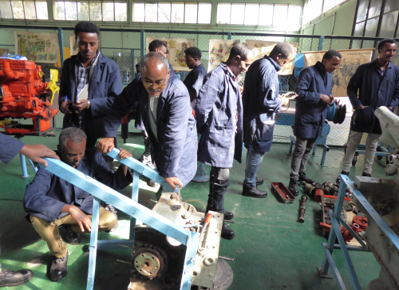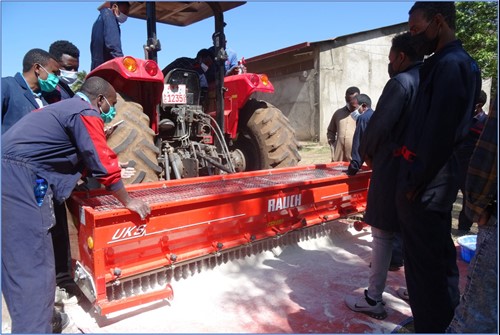News
Training the trainers: Sustaining efforts to support small-scale farmers in Ethiopia

News
Targeting Benin, Burkina Faso, Cameroon, Côte d’Ivoire, Ethiopia, Ghana, India, Kenya, Malawi, Mali, Mozambique, Nigeria, Togo, Tunisia, Viet Nam, and Zambia, Green Innovation Centres work with smallholdings in selected value chains. The programme offers advisory services and training courses to farmers, enabling them to use input-based, technical, knowledge-based and organisational innovations to improve their productivity, income and climate resilience in the long term.
As part of its “One World no Hunger” initiative, the German Federal Ministry for Economic Cooperation and Development (BMZ) launched the Green Innovation Centres for the Agriculture and Food sector (GIC) in 2014 to promote innovations in the agriculture and food sector. Established as a network across 14 countries, the aim of the GICs is to improve smallholder livelihoods, create jobs, and grow the regional food supply in selected rural target regions.
Ethiopia has hosted a GIC since 2015 when the Ministry of Agriculture and Natural Resources partnered with the Deutsche Gesellschaft für Internationale Zusammenarbeit (GIZ) GmbH, with NIRAS in a supporting role.

Within a year, the partners agreed to continue and broaden their cooperation in the area of Agricultural Technical, Vocational Education and Training (A-TVET). Since 2017, the programme has been supporting selected A-TVET colleges and the Ministry’s extension services mostly with training to help them sustain their ongoing development efforts for farmers in the longer term. With COVID-19 and a deteriorating security situation in Ethiopia, the project team launched a blended approach to deliver effective training, mixing conventional face-to-face teaching with the use of mobile applications, online learning, digital solutions and a Ministry-based helpdesk.
Cascading training down to small-scale farmers
GIC’s A-TVET component provided system-integrated agricultural training and support to education. Training of trainers ‒ such as agri-extension service subject matter specialists and development agents ‒ was a core part of the programme while the capacity of A-TVET colleges was bolstered through competence development of trainers; updated teaching, training and learning material; and improved equipment and infrastructure.
Although the regional focus of the programme was Oromia Regional State (specifically in Arsi zone), activities were extended to other areas such Amhara Regional State.

One of the main achievements of the programme was the roll-out of training to farm extension workers and the subsequent cascading of the client-centred extension approach (CCEA) down to small-scale farmers to increase their productivity, apply innovations and realise farming as a business.
Conventional training took place and was supplemented by a blended approach during and after the COVID-19 pandemic. This involved using an innovative mix of customized mobile app-guided individual learning and face-to face training. A CCEA help desk was established in the Ministry of Agriculture to support trainees.
senior professionals from public and private sectors qualified as lead trainers in the client-centred extension approach (CCEA)
subject matter specialists qualified as CCEA master trainers
development agents trained to roll out CCEA to small-scale farmers
Improving curricula and applying a digital approach
As the second primary target, A-TVET colleges received support in improving their existing crop production and farm mechanisation programmes, including hands-on practice-oriented technical training of both instructors and students, helping the latter qualify for the job market. More than 35 professionals from the private and public sector participated in the development of two curricula on farm mechanisation and equipment (operation and maintenance). College staff received training in rolling out this curricula, which included the production and adaptation of digital support materials and multimedia, strengthening their own pedagogical and didactical competencies.
As in the case of farm extension services, a blended learning system was designed to support learners to progress independently via the use of mobile apps followed by in-person practical training. App features included learning guides and information and operation sheets, self-check tests, video-based content and additional resources and links. The Ministry helpdesk was also available as a resource.
instructors participated in practice-oriented technical training in the field of farm machinery operation, farm machinery maintenance, advanced irrigation system, crop production, and pest control
students received practice-oriented farm mechanization training to qualify for the national occupational competency assessments
As the A-TVET component drew to a close this past March, the team identified some challenges that hindered their outreach. Apart from COVID and the instability of the security situation, there was a lack of well-equipped training centres for practice-oriented farm mechanisation and crop production training, and the participation of women ‒ especially in the former training ‒ was low.. Blended learning, digitising materials and online learning methods also require specific equipment and appropriate skills and technology to be effective. These are important learnings to be taken on board in future efforts focussed on A-TVET.

